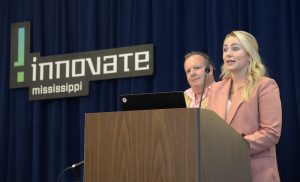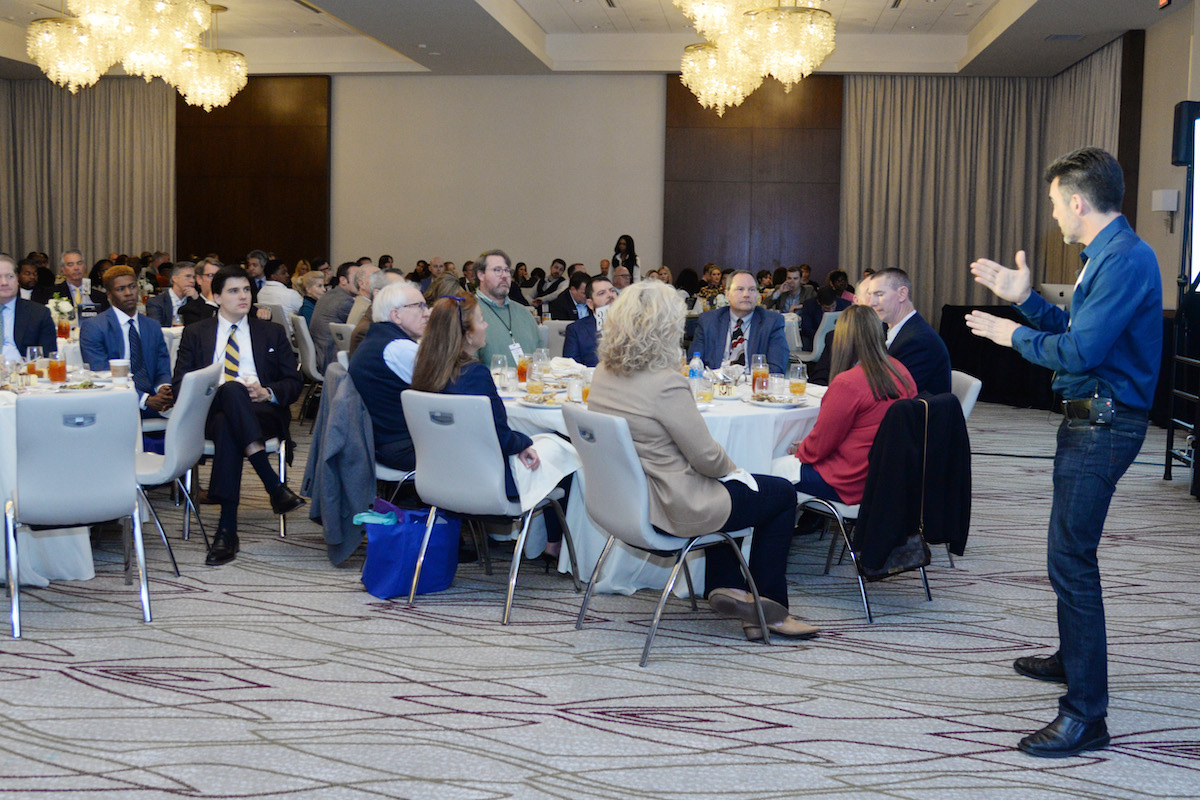In the past decade, over 100 percent of job growth has come from companies less than five years old, said J.F. Gauthier, founder of Startup Genome and keynote speaker for Accelerate 2021. As legacy corporations automate more jobs and streamline their workforces, startup companies create the jobs that fill those gaps and grow the economy. And, when nurtured, startups can create high-paying jobs in cities and states that aren’t traditionally associated with the technology sector.
“I tell them, do you want to fly to see your kids in [cities like New York or Atlanta] … or drive to see your kids?” Gauthier told the crowd of over 400 at the Westin Jackson’s conference center. Cities as diverse as Waterloo in Ontario, Canada and Buffalo, NY, have seen growth in high-paying jobs and a multiplier effect that means tens and sometimes hundreds of thousands of new jobs for their economies.

The Accelerate 2021 conference, powered by mTrade, marked a return to in-person sessions, starting with the Company and Investor Spotlight on Tuesday, November 9th. During that afternoon, 12 companies working with Innovate Mississippi pitched audience members, getting feedback from the professionals and investors in the audience. In between those startup pitches, investors took the stage to discuss the climate for high-growth investment in Mississippi and what they’re looking for as investors.
On Wednesday, the main conference began with a breakfast keynote with quick pitches by two companies—Moonshine Mississippi and ConnectVNA—as a sample of the Company and Investor Spotlight. Lieutenant Governor Delbert Hosemann then took the stage to discuss, in part, the extraordinary state and federal infrastructure investment dollars pouring into the state’s coffers. That money will be managed and spent by the Legislature and local governments on roads, water, broadband and other items that will hopefully boost Mississippi’s economic competitiveness and viability into the future.
Breakfast finished with Innovate Mississippi CEO Tony Jeff presenting his talk “Only the Paranoid Survive,” focused on how vital it is to focus your startup company on the question: “What is stopping you from being the biggest in the world at what you do?”

After breakfast, attendees visited the 21 vendors on Innovation Alley, meeting the event’s sponsors offering services and support for entrepreneurs and growing businesses. At the same time, pre-registered entrepreneurs got ready for their appointments in our VIP and Mentor Lounge. They met with our VIP investors or with finance, marketing, and operations mentors.
Next up, the conference split into two different tracks: Big Ideas and Block and Tackle. The Block and Tackle sessions, designed for entrepreneurs and those planning startups, focused on sales and marketing, hiring a technology team, and starting your company with Series A funding in mind.
On the Big Ideas track, panel discussions focused on Mississippi universities’ role in the entrepreneurial ecosystem and emerging technology’s effect on traditional Mississippi sectors such as agriculture and fisheries.
“You’re not going to recognize a farm in 15 years,” said Cade Moody, technology specialist at Wade, Inc., referencing the extraordinary amount of data and automation that the industry is putting to use. “We have this technology that can identify a weed and discern it from dirt. When it sees that weed, it’s going to spot spray [it]. So you’re talking 70, 80, 90 percent chemical reduction.”
Dr. Brian Cuevas, director of the Office of Technology Development at the University of Southern Mississippi, noted the Gulf Coast’s significant investment in “blue tech,” particularly after Hurricane Katrina. Drawing similarities to advances in agriculture, Cuevas mentioned autonomous vehicles that the industry is developing for fisheries and other oceanic purposes, along with a strong interest in data analytics—knowing more about the ocean.
“We know more about Mars than we know about our own oceans. There are a lot of companies out there…inspired to be the ‘Google Earth of the oceans.'” He went on to say that work will also mean vast amounts of data to process into useful information for decision-making.

In the Big Ideas session focused on Mississippi’s universities as resources for entrepreneurship, participants focused on the collaboration and cooperation that has grown in the past few years among the state’s research universities as they seek to specialize and support the state in its startup growth.
“It’s always a collaboration of people with different expertise and many times from different institutions,” said Jeremy Clay, director of Mississippi State University’s Office of Technology Management. “Having those shared technologies among the universities and having those kinds of bigger collaborations of research teams … results in better science and more impactful technologies.”
The event culminated in the luncheon keynote, where Gauthier recounted the success in Waterloo, Ontario, a metro area similar to metro Jackson, Mississippi. With the support of local universities and “air cover” from local government, Waterloo moved from a fading industrial town to a hub of entrepreneurial activity, creating 1,000 startups and 25,000 high-paying technology jobs that had a halo effect of creating another 100,000 jobs within that community. While many moving parts made it happen, he noted that connections ultimately make startups grow.
“We quantified that…and you could see rapidly that those startups that are more connected—that live in ecosystems or in groups that help each other—see their revenues grow two times faster,” Gauthier said.
Gauthier said similar entrepreneur-driven growth is possible in Mississippi as Startup Genome and the states’ stakeholders get to work. “Together, we will tailor a plan of action that will work.”

